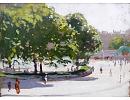Contact Seller
Hurlingham Fine Arts
Tel01428 714991or07973801337Please quote Antiques Atlas.

 Oil on Canvas of Horse Racing Scene
Oil on Canvas of Horse Racing Scene
 Portrait of the Margrave of Brandenburg-Ansbach
Portrait of the Margrave of Brandenburg-Ansbach
 Oil on Board Portrait of a Gentleman c1720.
Oil on Board Portrait of a Gentleman c1720.
 Oil on Board Portrait of a Lady. c1720.
Oil on Board Portrait of a Lady. c1720.
 Portrait of an English Lady. c.1760
Portrait of an English Lady. c.1760
 Horse & Jockey Oil on Canvas c1870.
Horse & Jockey Oil on Canvas c1870.
 Large Oil Painting of French Rural Scene 1934
Large Oil Painting of French Rural Scene 1934
 Oil Portrait of a girl R A Artist Michael Blaker
Oil Portrait of a girl R A Artist Michael Blaker
 Antique Oil Painting of Montmartre Paris
Antique Oil Painting of Montmartre Paris
 Painting Oil On Canvas Landscape Grazing Animals
Painting Oil On Canvas Landscape Grazing Animals
 Oil of a rough collie by George Earl 1824-1908
Oil of a rough collie by George Earl 1824-1908
 Garden Scene oil painting by Graham Petrie
Garden Scene oil painting by Graham Petrie
Non UK callers :
+44 1428 714991
or +44 7973801337
or +44 7973801337
William Stanley Haseltine 1835-1900 Ostia Italy

A delightful small oil painting of the Castello Di Giulio II at Ostia, Lazio, Italy, by American and Hudson River School artist, William Stanley Haseltine, possibly a sketch for a larger work.
The subject must have had special significance because Haseltine painted two other larger versions of the same view. A distant view of the castle features in his painting, 'Castle of Ostia Seen from the Pine Forest of Castel Fusano,1871', which was well received at the time. Anne Brewster, a journalist and foreign correspondent then living in Rome, wrote in the Philadelphia Evening Bulletin,27 May 1872, 'I mentioned, in a previous letter to the Bulletin, Stanley Haseltine's pictures and made especial notice of the "Pines at Castel Fusano, near Ostia." That was when it was first painted. Since then it has made quite a furore among the artists German, French and Spanish. It is one of the best pictures of the season, and indeed an inspiration that rarely comes even to a gifted artist such as Haseltine. His orders have been numerous this season, not only among Americans but for England and from the Royalties that have visited Rome during the winter, Nassau, Denmark etc. You may be proud of your townsman, I have just sent a long account to the Boston Advertiser, otherwise I should dwell longer on him and his works."
This painting is also illustrated, page 38 b&w fig.5 in the 1992 publication 'Expressions of Place, The Art of William Stanley Haseltine', section 'Haseltine in Rome' by Andrea Henderson, where she describes the painting thus," Haseltine captures the transient moment between night and day. The warm glow of the sun emanating from behind the medieval castle of Ostia throws the foreground trees into haunting silhouette and emphasizes the shadowy recesses of the pine grove at the right edge of the painting. Recurrent in nineteenth-century descriptions of Ostia and Castel Fusano are references to the hazards of the fever-laden water of this area and the death-like stillness that prevails."
The fortress was built towards the end of the 15th century, and represents one of the most important examples of Renaissance military architecture. It was subsequently ransacked by the Lansquenets, restored by Pope Paul III and finally besieged by the Spaniards. During this time, being situated so close to Rome, it was the centre of military power for the Pontiffs. However, it was abandoned after the great flood of 1557 when the course of the River Tiber was then redirected.
Haseltine arrived in Dusseldorf in 1855 to be tutored by Andreas Achenbach. His friends and constant companions were fellow American artists, Emmanuel Leutze, Worthington Whittredge and Albert Bierstadt. Summer vacations were spent sketching together in Switzerland and Haseltine accompanied the three when they moved to Rome in 1857. He studied in the Campagna with Leutze and Whittredge, travelled to Capri, Amalfi and Ischia in 1858 and returned to the U.S. In 1860 he married Helen Lane and took a studio with Leutze and Whittredge in the Studio Building, NYC By 1864 he was a widower with a young son, Stanley Lane Haseltine. In 1866, he travels to Paris with second wife, Helen Marshall Haseltine and in 1867 visits Como, Riviera, La Spezia, and Porto Venere before finally settling for life in Rome with almost yearly visits to the U.S. His studio was in Via dei Greci.
Oil on prepared paper laid on canvas, signed by the artist with initials ' W.S.H.'
SellerHurlingham Fine Arts
View all stock from
Hurlingham Fine Arts

 Private dealer
Private dealer
By appointment only
Hampshire
England
Tel : 01428 714991
or : 07973801337
Non UK callers : +44 1428 714991 or +44 7973801337
The subject must have had special significance because Haseltine painted two other larger versions of the same view. A distant view of the castle features in his painting, 'Castle of Ostia Seen from the Pine Forest of Castel Fusano,1871', which was well received at the time. Anne Brewster, a journalist and foreign correspondent then living in Rome, wrote in the Philadelphia Evening Bulletin,27 May 1872, 'I mentioned, in a previous letter to the Bulletin, Stanley Haseltine's pictures and made especial notice of the "Pines at Castel Fusano, near Ostia." That was when it was first painted. Since then it has made quite a furore among the artists German, French and Spanish. It is one of the best pictures of the season, and indeed an inspiration that rarely comes even to a gifted artist such as Haseltine. His orders have been numerous this season, not only among Americans but for England and from the Royalties that have visited Rome during the winter, Nassau, Denmark etc. You may be proud of your townsman, I have just sent a long account to the Boston Advertiser, otherwise I should dwell longer on him and his works."
This painting is also illustrated, page 38 b&w fig.5 in the 1992 publication 'Expressions of Place, The Art of William Stanley Haseltine', section 'Haseltine in Rome' by Andrea Henderson, where she describes the painting thus," Haseltine captures the transient moment between night and day. The warm glow of the sun emanating from behind the medieval castle of Ostia throws the foreground trees into haunting silhouette and emphasizes the shadowy recesses of the pine grove at the right edge of the painting. Recurrent in nineteenth-century descriptions of Ostia and Castel Fusano are references to the hazards of the fever-laden water of this area and the death-like stillness that prevails."
The fortress was built towards the end of the 15th century, and represents one of the most important examples of Renaissance military architecture. It was subsequently ransacked by the Lansquenets, restored by Pope Paul III and finally besieged by the Spaniards. During this time, being situated so close to Rome, it was the centre of military power for the Pontiffs. However, it was abandoned after the great flood of 1557 when the course of the River Tiber was then redirected.
Haseltine arrived in Dusseldorf in 1855 to be tutored by Andreas Achenbach. His friends and constant companions were fellow American artists, Emmanuel Leutze, Worthington Whittredge and Albert Bierstadt. Summer vacations were spent sketching together in Switzerland and Haseltine accompanied the three when they moved to Rome in 1857. He studied in the Campagna with Leutze and Whittredge, travelled to Capri, Amalfi and Ischia in 1858 and returned to the U.S. In 1860 he married Helen Lane and took a studio with Leutze and Whittredge in the Studio Building, NYC By 1864 he was a widower with a young son, Stanley Lane Haseltine. In 1866, he travels to Paris with second wife, Helen Marshall Haseltine and in 1867 visits Como, Riviera, La Spezia, and Porto Venere before finally settling for life in Rome with almost yearly visits to the U.S. His studio was in Via dei Greci.
Oil on prepared paper laid on canvas, signed by the artist with initials ' W.S.H.'
Price
Click here to message the seller The price has been listed in British Pounds.
Conversion rates as of 14/NOV/2024. Euro & Dollar prices will vary and should only be used as a guide.
Always confirm final price with dealer. Price to be added.
DimensionsSight size 5.25 x 9.75 inches, overall framed size 9.75 x 14.25 inches
Category Antique Pictures / Engravings / Art
> Antique Oil Paintings
Date 1871
Mid Victorian Antiques Material Oil Painting on Canvas
Origin American
Condition Good clean condition
Item code as988a044
Status For Sale
£2800.00 
$3558.24
€3364.48

$3558.24

€3364.48

Looking to Buy?
Arrange a final price and delivery details directly with the dealerClick here to message the seller
Conversion rates as of 14/NOV/2024. Euro & Dollar prices will vary and should only be used as a guide.
Always confirm final price with dealer. Price to be added.
Terms and conditions
Payment by Bank Transfer or Cheque
View all stock from
Hurlingham Fine Arts

 Private dealer
Private dealerBy appointment only
Hampshire
England
Tel : 01428 714991
or : 07973801337
Non UK callers : +44 1428 714991 or +44 7973801337
You may also be interested in
 Oil on Canvas of Horse Racing Scene
Oil on Canvas of Horse Racing Scene
 Portrait of the Margrave of Brandenburg-Ansbach
Portrait of the Margrave of Brandenburg-Ansbach
 Oil on Board Portrait of a Gentleman c1720.
Oil on Board Portrait of a Gentleman c1720.
 Oil on Board Portrait of a Lady. c1720.
Oil on Board Portrait of a Lady. c1720.
 Portrait of an English Lady. c.1760
Portrait of an English Lady. c.1760
 Horse & Jockey Oil on Canvas c1870.
Horse & Jockey Oil on Canvas c1870.
 Large Oil Painting of French Rural Scene 1934
Large Oil Painting of French Rural Scene 1934
 Oil Portrait of a girl R A Artist Michael Blaker
Oil Portrait of a girl R A Artist Michael Blaker
 Antique Oil Painting of Montmartre Paris
Antique Oil Painting of Montmartre Paris
 Painting Oil On Canvas Landscape Grazing Animals
Painting Oil On Canvas Landscape Grazing Animals
 Oil of a rough collie by George Earl 1824-1908
Oil of a rough collie by George Earl 1824-1908
 Garden Scene oil painting by Graham Petrie
Garden Scene oil painting by Graham Petrie








